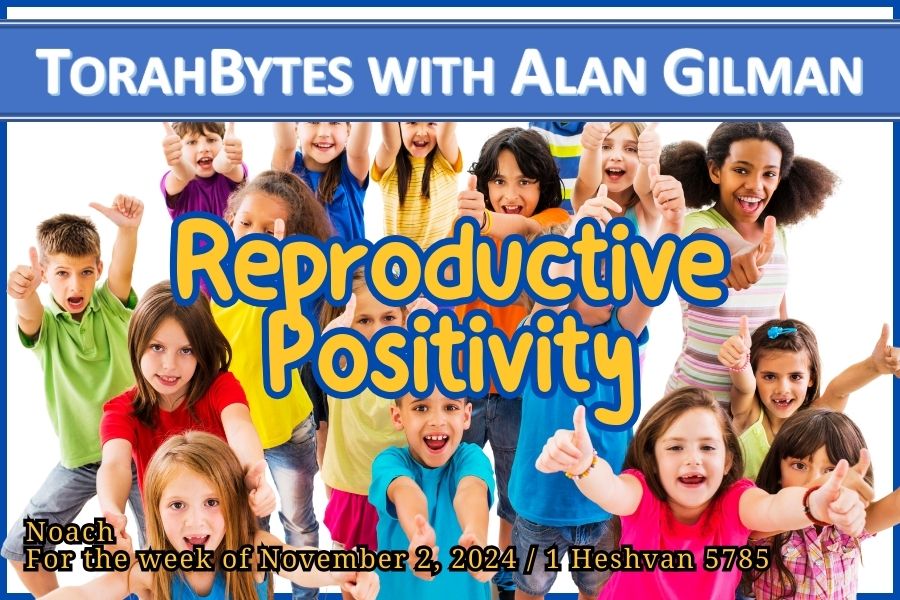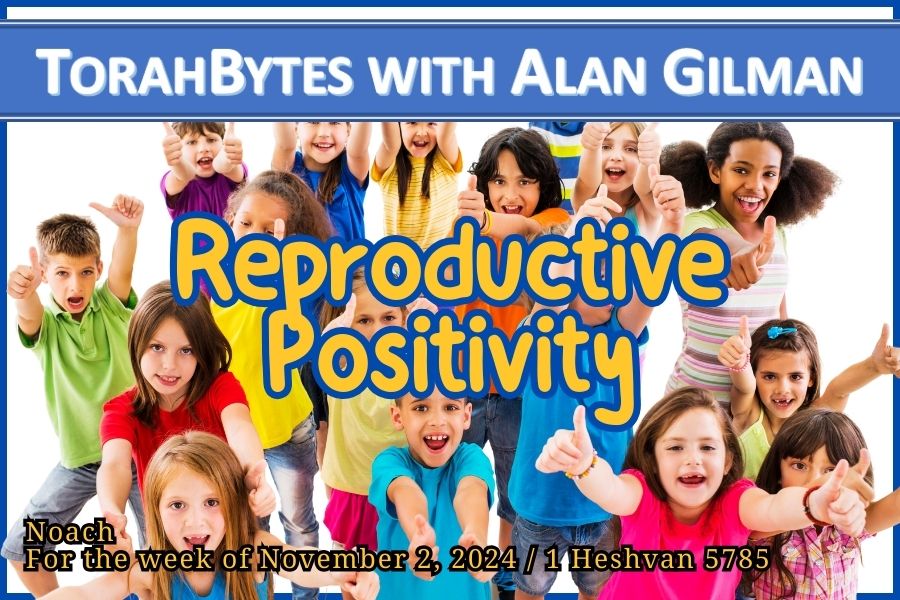
Reproductive Positivity
For the week of November 2, 2024 / 1 Heshvan 5785

Noach
Torah: Bereshit/Genesis 6:9 – 11:32
Haftarah: Isaiah 66:1-24
And God blessed Noah and his sons and said to them, “Be fruitful and multiply and fill the earth.” (Bereshit/Genesis 9:1)
I like to think of the story of Noah and the flood as God’s reboot, a system refresh. Seeing that human beings, whom he made in his image, had become deeply corrupted, we read, “And the LORD regretted that he had made man on the earth, and it grieved him to his heart” (Bereshit/Genesis 6:6). And yet, he did not wholly give up on his creation project, including on human beings. I imagine he could have completely obliterated Planet Earth, but he didn’t. Instead, his commitment to his original plan led him to restart what he had initiated “in the beginning” (see Bereshit/Genesis 1:1).
There is reason to believe that the post-flood world was different in some ways from the Earth’s original design, including permitting humans to eat animals (see Bereshit/Genesis 9:3) and significantly reduced lifespans. But for the most part, God’s creation project was moving ahead as planned. Central to that plan is the essential role he gave to human beings. As creatures made in his image, men and women, despite our corrupt nature, we were to continue to represent him on Earth. God, the ultimate king of the universe, determined that we should rule Planet Earth under his direction (see Bereshit/Genesis 1:26, 28).
This unique leadership role underlies God’s very first directive: “Be fruitful and multiply and fill the earth” (Bereshit/Genesis 1:26). As humans were to rule over the entire planet, it was necessary to reproduce accordingly. Note that the issues arising from Adam and Eve’s disobedience in no way undermined this foundational command as it is repeated to Noah (see Bereshit/Genesis 9:1, 7)—a command that has never been rescinded or modified in any way.
As a father of ten (now adult) children, I am aware of how controversial and emotional the topic of human reproduction can be. I don’t have the space here for a deep dive into all the concerns and reactions people may have. But let me offer this: I believe that at the core of this issue is the inability or unwillingness to view ourselves from God’s perspective. I am painting this as personal on purpose. Much of the negativity in our society towards God’s unchanged directive to be fruitful and multiply can be found in the mirror. I don’t mean you are the problem necessarily; it’s that we human beings have such a low view of ourselves that, given the choice, we don’t want too many of us around.
Most of us don’t believe what I attempted to explain in last week’s message, You Are God’s Great Idea. Even those with a positive self-image don’t realize how great an idea we are. Zero population advocates and other extreme environmentalists don’t only warn us of the existential threats plaguing our planet today; they insist that we are the problem. I admit that we cause great problems. The Bible agrees but also clearly asserts that we are the solution.
Some may react to such a statement, insisting God is the only solution to the Earth’s problems. That’s true, but how does he do it? God is determined to work out his purposes for Planet Earth through his image bearers, human beings. Not only do we see this in his reiterating his reproduction directive, but in his taking on human form as the Messiah to eventually bring about the new creation. But doesn’t the actions of the Messiah prove the failure of human beings to fulfill our God-given mission? Not if I read the Bible correctly. The Messiah’s actions equip those loyal to him to join him in fulfilling God’s purpose for humankind. He doesn’t replace or distract from our being God’s image bearers but rather enables us to become everything we were made to be.
Once we, as human beings, understand who we really are and what we are called to do, I suspect that our perspective on reproduction would become overwhelmingly positive. Combine that with God’s promise of provision according to our needs (see Matthew 6:25-34), how many more children might we welcome into the world?
Scriptures taken from the English Standard Version